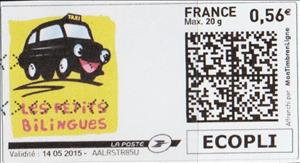Stamp: Petits Bilingues (France 2015)
Petits Bilingues (France 2015)
01 January (France ) within release MonTimbrEnLigne. Personalised goes into circulation Stamp Petits Bilingues face value 0.56 Euro
| Stamp Petits Bilingues in catalogues | |
|---|---|
| Colnect codes: | Col: FR-TIM 2015-237 |
Stamp is square format.
English language coursesAlso in the issue MonTimbrEnLigne. Personalised:
- Stamp - Ecole MCF Moniteur Motocycliste Francais face value 0.58;
- Stamp - Lorry and trailer face value 0.64;
- Stamp - Univers Maison face value 0.58;
- Stamp - Assurance Vincent Rodhon face value 2.20;
- Stamp - Blaq face value 2.59;
- Stamp - Meth&Or / Metheor face value 0.63;
- Stamp - Alpes CAD Formation face value 0.58;
- Stamp - Bcs Station Service face value 0.56;
- Stamp - Financieres des Alpes face value 0.65;
- Stamp - GIX Immobilier face value 4.93;
- Stamp - Immobiliare Agence face value 4.64;
- Stamp - Iso-Logement face value 0.58;
- Stamp - Iz.ba Izdarq Bauchet Architecture face value 0.76;
- Stamp - Le Grand Bivouac face value 0.58;
- Stamp - March Promotion face value 0.58;
- Stamp - MBI Realisations face value 0.64;
- Stamp - Petits Bilingues face value 0.56;
- Stamp - Protectas Securite face value 0.58;
- Stamp - Scommc face value 0.65;
- Stamp - Targnier Chauffage Plomberie Electricte face value 0.65;
- Stamp - Votre Project Immobilier face value 0.58;
- Stamp - Avocat Justice Defence Conseils face value 0.74;
- Stamp - Fidextra face value 0.58;
- Stamp - Photographe Art Evenements Souvenirs face value 0.64;
- Stamp - Protectas Securite face value 0.74;
- Stamp - Ambulances VSL Taxi face value 0.94;
- Stamp - JDS Avocats face value 2.54;
- Stamp - Le Bigot face value 0.64;
- Stamp - Prolegem Societe Avocats face value 1.79;
- Stamp - RPB Brunel Privard Regnard face value 0.58;
- Stamp - Sarl Jouhanneau Mechanique Agricole face value 1.06;
- Stamp - EG Active Lyon face value 0.58;
- Stamp - Gpcservices face value 2.99;
- Stamp - CSPAP Conseil Strategy Patrimoniale Assurance Personnes face value 0.65;
- Stamp - Parker and Perrot Huissiers face value 1.79;
- Stamp - Yonis face value 1.65;
- Stamp - Mecariom Mechanique de precision face value 1.79;
- Stamp - Auto Moto Ecole Poncet face value 0.74;
- Stamp - Chauffage face value 0.74;
|
Data entry completed
50%
|
|
|---|---|
| Stamp Petits Bilingues in digits | |
| Country: | France |
| Date: | 2015-01-01 |
| Emission: | Personalized - Private |
| Format: | Stamp |
| Face Value: | 0.56 Euro |
Stamp Petits Bilingues it reflects the thematic directions:
A car is a wheeled, self-powered motor vehicle used for transportation and a product of the automotive industry. Most definitions of the term specify that cars are designed to run primarily on roads, to have seating for one to eight people, to typically have four wheels with tyres, and to be constructed principally for the transport of people rather than goods. The year 1886 is regarded as the birth year of the modern car. In that year, German inventor Karl Benz built the Benz Patent-Motorwagen. Cars did not become widely available until the early 20th century. One of the first cars that was accessible to the masses was the 1908 Model T, an American car manufactured by the Ford Motor Company. Cars were rapidly adopted in the United States of America, where they replaced animal-drawn carriages and carts, but took much longer to be accepted in Western Europe and other parts of the world.
Language is a structured system of communication that consists of grammar and vocabulary. It is the primary means by which humans convey meaning, both in spoken and written forms, and may also be conveyed through sign languages. Human language is characterized by its cultural and historical diversity, with significant variations observed between cultures and across time. Human languages possess the properties of productivity and displacement, which enable the creation of an infinite number of sentences, and the ability to refer to objects, events, and ideas that are not immediately present in the discourse. The use of human language relies on social convention and is acquired through learning.
Logos is a term used in Western philosophy, psychology and rhetoric, as well as religion (notably Christianity); among its connotations is that of a rational form of discourse that relies on inductive and deductive reasoning.




